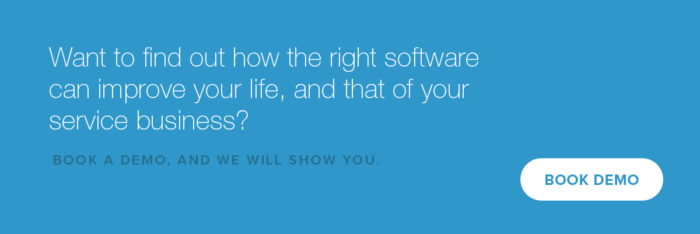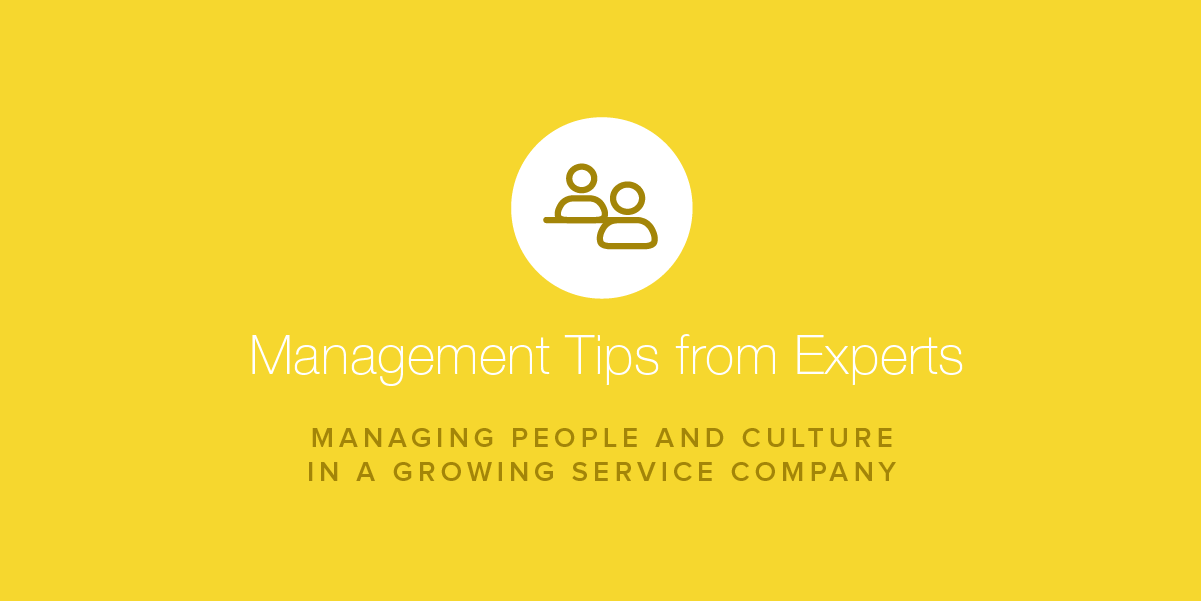Expert Tips: Managing People and Culture in a Growing Service Company
- March 12, 2019
- By: Vonigo
When your service company starts to grow, it can be difficult to maintain the same culture you had when you were a smaller organization. Finding the right team members and maintaining the job satisfaction and attitudes of the entire team can be a challenge as you expand.
We asked the experts: What tips do you have for service companies for managing people and culture as businesses grow? Here’s what they had to say.
1. Jeff Toister, Author

The most important thing a home services company can do to build a strong culture
A customer service vision provides that guidance. It’s a simple statement, typically just one sentence, that describes the service the business is trying to provide.
Service Company Example
Ideal Plumbing, Heating, Air, and Electrical is an award-winning service company in San Diego. Its customer service vision is: “We promise to provide you with the highest standards of workmanship and service in our industry.”
Ideal’s technicians visit each customer’s home knowing they are there to do more than just fix a problem. Their goal is to do the best work and provide the best service in the industry. To maintain consistency, Ideal’s technicians meet every other week to reinforce the vision, share best practices, and discuss ways to continuously improve.
2. Lindsay Anvik, Business Coach and Keynote Speaker

I’m a business coach and keynote speaker specializing in leadership and productivity. Here are a few thoughts on service companies that are growing
Delegate Responsibilities
Creating a team lead or assistant manager can help you focus on the bigger picture, while the newly promoted staff member can take on day-to-day tasks, questions, and issues.
Get a Virtual Assistant
Have a Way to Communicate with Your Team All at Once
Whether it’s through an open text message thread or a more formalized platform like Slack, it is important to be able to notify your staff of updates, employee policies, and reminders.
Take Away Headaches
Get a cloud-based system to eliminate headaches like invoicing, scheduling, client inquiries, and inventory. If your business is growing, you’re likely having a hard time keeping up with your growing list of clients and employees.
Being able to easily access this kind of information on the go, manage it and delegate from there can help the customer tremendously. Vonigo is a solid option for anyone looking to streamline the process when their business is growing.

3. Aleassa Schambers, Director of Marketing, Root

70% of consumers make their purchase decisions based on how they’re treated. To build a customer-first culture, leaders should be focusing on:
A. Define the Customer-First Culture
There’s no one-size-fits-all company culture. Attitudes, beliefs, behaviors, etc. are how companies differentiate themselves. Leaders need to be clear on their definition of customer-centricity and loyalty. What do customers want? How is it delivered? Is the frontline equipped to make customer-focused decisions that achieve those goals? Are the right processes and thinking in place (internally and externally). How to do this
- Put words to what
a desired culture looks and acts like for the business – be as specific as possible. Senior leaders must be aligned and clear on what that means, in all functions. Every frontline and back-office role impacts the customer experience. - Develop a “story” with actual visualization of that culture. Visuals eliminate the fuzziness of words. Here’s an example.
B. Managers are Critical to the Process
Frontline managers
- Help managers understand their role. Don’t assume they know it. Engage them, coach them and have an open dialogue about how to act like an owner. Managers link senior leaders and the frontline. Understanding the strategy, connecting that strategy to their teams (how they support the strategy), and coaching their people so every individual understands how their job impacts the customer strategy.
- Drive ownership of the team’s results with tools like Customer Experience Scoreboards.
C. Individuals Must Create Authentic Customer Experiences
The frontline must understand the brand promise, behave in ways that support that promise and be 100% consistent. Being authentic means understanding the customer-first culture, but having leeway to make it personal for themselves and for the customer. How to do this?
- Make sure each person in the company understands the big-picture approach to customer experience. Use a variety of methods (because everyone learns differently).
- Build employees’ sales and service skills and give them easy references and tools for doing their jobs well
- Set clear service standards and guide employees on how to make tradeoffs and decisions
in the moment.
Here’s a couple of case studies if you’re interested: American Airlines or Cheddar’s Scratch Kitchen.
4. Stan Acton, Founder and CEO, Acton ADU

Aside from having a culture that matches your company’s values, we’ve found that the centerpiece for what makes Acton ADU culture strong is accountability.
We very specifically reward accountability. If a team member feels comfortable with making a mistake, for example, and sharing the result of that mistake.
They’ll be more motivated to think in terms of solutions, instead of trying to cover up or not own up to their misstep.
5. Julia Monahan, Director of Marketing, The Alternative Board

I work with The Alternative Board, we help forward-thinking business owners grow their businesses, increase profitability and improve their lives by leveraging local business advisory boards, private business coaching, and proprietary strategic services.
We have done business owner surveys in the past and have one that focuses on Culture.
Survey Results
- Owners who say that they have a Strong Culture (41%) are much more likely to spend the majority of their time on Employee Motivation & Collaboration than those who say that they have an Average or Weak Culture (28%).
- Business owners who say that they have a Strong Culture (50%) are much more likely to strongly agree that their culture increases their profitability than those who say that they have an Average or Weak Culture (20%).
- Owners who say that they have a Strong Culture (69%) are much more likely to get feedback from their employees about a prospective candidate fitting their company culture than those who say that they have an Average or Weak Culture (58%).
Work environments where people feel like it’s “every man for himself” will hasten burn-out and end with a severe drop in morale. Creating cross-functional groups that bring together colleagues in other departments to work as a focused team can create a better understanding of the work and company as a whole.
Software to Help Your Business Grow
Interested to learn about how software designed for service companies can help you grow your business and make it more profitable? Book a free, private demo of Vonigo.



